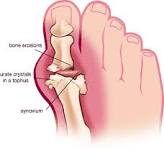
What is Gout? How to manage it? What are the precautions to be taken? What are the signs and symptoms? What is the cause of this disease? How to treat it? How can homeopathy help you? All of this answered, in this post and of course our doctors always there to help you. Just fill in your details in the form down below and we will answer all your questions for FREE!

What Gout is?
• It is a condition in which the level of uric acid increases in the body.
• In gout, the crystals of urate get deposited in the joints resulting in joint inflammation.
• It is a chronic and progressive disease.
Which age group is more affected due to gout?
• Mainly the males are more affected than females.
• Between 30 to 60 years of age persons are more affected.
• Women get affected after menopause.
What are the types of gout?
• Asymptomatic hyperuricemia:
In this type, the level of uric acid increases in blood but produces no symptoms.
• Acute gouty arthritis:
-In this type uric acid crystals get deposited in the joint spaces.
-And the acute symptoms appear.
-Joint gets swollen with throbbing pain.
-The patient will develop a fever with chill.
-The inflammation may travel into the ankle and underneath the foot.
• Intercritical gout:
In this type of gout acute symptoms subside with no pain or discomfort and joints function normally.
• Chronic tophaceous gout:
-In this type of gout, the permanent damage to affected joints as well as kidney damage occurs.
-Formation of tophi also occurs in joints.
What are the causes of gout?
• The gout is caused by when there is a disturbance in Purine metabolism of the body.
• Uric acid is a waste product of the body, which is produced as a result of the breakdown of Purine in the body.
• Most of the time uric acid dissolves and goes into the urine via the kidneys.
• Factors that increase the uric acid level in the body are:
• Obesity.
• Excess alcohol.
• Diet rich in purine foods, such as seafood and meat.
• Diets low in calories.
• Regular use of diuretic medicines.
• Medicines are taken by transplant patients, such as cyclosporine.
• Rapid weight loss.
• Chronic kidney disease.
• Hypertension.
• Psoriasis.
• Tumors.
• Myeloma.
• Hemolytic anemia.
• Lead poisoning.
• Hypothyroidism.
• Surgery.
What are the sign and symptoms of gout?
• Severe pain in the joints: Pain in ankles, hands, wrists, knees or feet. The big toe is most commonly affected.
• Itchy and peeling of the skin.
• Redness and inflammation of the affected part.
• Fever.
• Loss of flexibility of the affected joint.
• Nodules: Gout may first appear as tophi (nodules) in the elbows, hands, or ears.
What is the differential diagnosis of the group?
• Cellulitis.
• Tenosynovitis.
• Bursitis.
• Arthritis.
• Nephrolithiasis.
• Paronychia.
How to investigate gout?
• History of the patient.
• Family history of the patient.
• Joint fluid analysis.
• A blood test to check for the uric acid level in blood.
• X-rays to see joint damage.
How to treat gout?
• Nonsteroidal anti-inflammatory drugs.
• Colchicine.
• Corticosteroids.
What is the management of gout?
• Keep the swollen joint elevated above chest as much as possible.
• The ice packs can be helpful in relieving pain and reducing inflammation.
• Adequate hydration should be maintained to minimize the frequency and intensity of attacks.
• Avoid alcohol.
• Have a moderate amount of protein.
• Limit your daily intake of meat, fish, and poultry.
• Slow exercises.
Diet:
• Low fat-containing dairy products.
• Fresh vegetables.
• Fresh fruits.
• Grains.
• Avoid alcohol, meat, seafood, junk food.
• Apples, banana, cucumber, and garlic.
• Adding folic acid and vitamin C in the diet.
• Drinking plenty of water.
• Avoiding drugs.
What are the complications of gout?
• Kidney stones.
• Gouty arthritis.
• Chronic kidney failure.
Can homeopathic medicines help in the case of gout?
Yes, homeopathic medicine helps symptomatically. Some of the homeopathic medicines which can help in this case. These are:
• Actaea spicata
• Arnica montana
• Colchicum autumnale
• Kalium carbonicum
• Lycopodium clavatum
For more information, you can visit WebMD and MedicineNet.
We have a strong web presence all across the globe with patients in major countries like United States, Australia, United Arab Emirates, Canada, United Kingdom, most European countries, & even smaller counties like Uganda, Nepal, Bangladesh and many more.
We have a very efficient team of doctors which includes the right combination of highly experienced doctors and the doctors of the new age.
Our main aim is to make the patient comfortable so that the case can be taken with ease and the patient be treated properly.
** The text on this website is sourced from websites like emedicine and/or other verified material by government agencies around the globe along with valuable inputs and additions by our team. The content of this page is proofread and updated by the team of doctors, every once in a while, to provide the most accurate information.